FIAT DUCATO BASE CAMPER 2014 Owner handbook (in English)
Manufacturer: FIAT, Model Year: 2014, Model line: DUCATO BASE CAMPER, Model: FIAT DUCATO BASE CAMPER 2014Pages: 367, PDF Size: 20.39 MB
Page 161 of 367
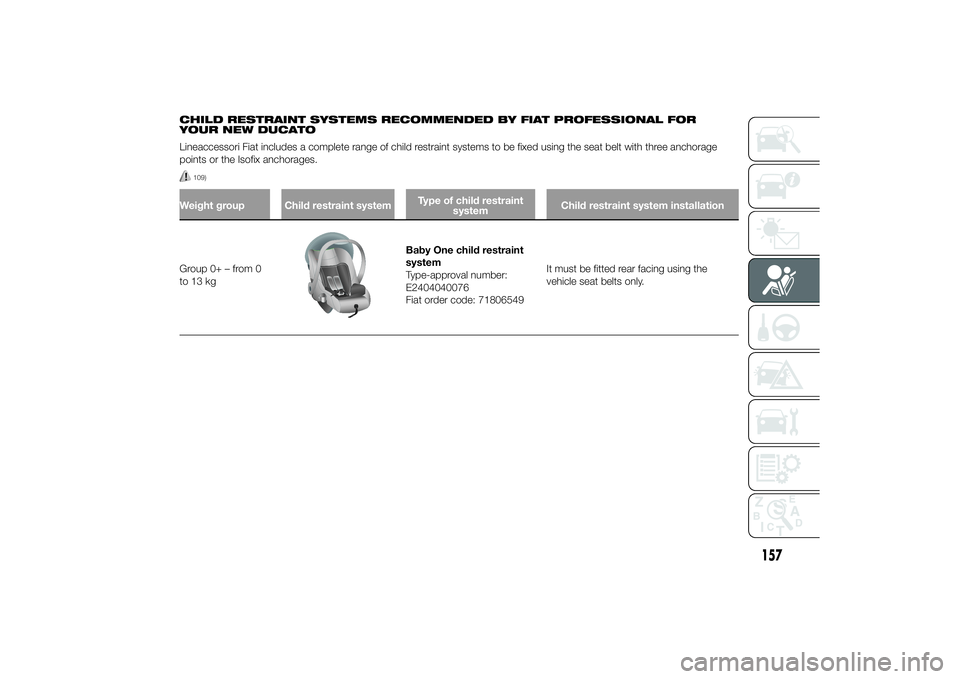
CHILD RESTRAINT SYSTEMS RECOMMENDED BY FIAT PROFESSIONAL FOR
YOUR NEW DUCATO
Lineaccessori Fiat includes a complete range of child restraint systems to be fixed using the seat belt with three anchorage
points or the Isofix anchorages.
109)
Weight group Child restraint systemType of child restraint
systemChild restraint system installationGroup 0+ – from 0
to 13 kg
Baby One child restraint
system
Type-approval number:
E2404040076
Fiat order code: 71806549It must be fitted rear facing using the
vehicle seat belts only.
157
Page 162 of 367
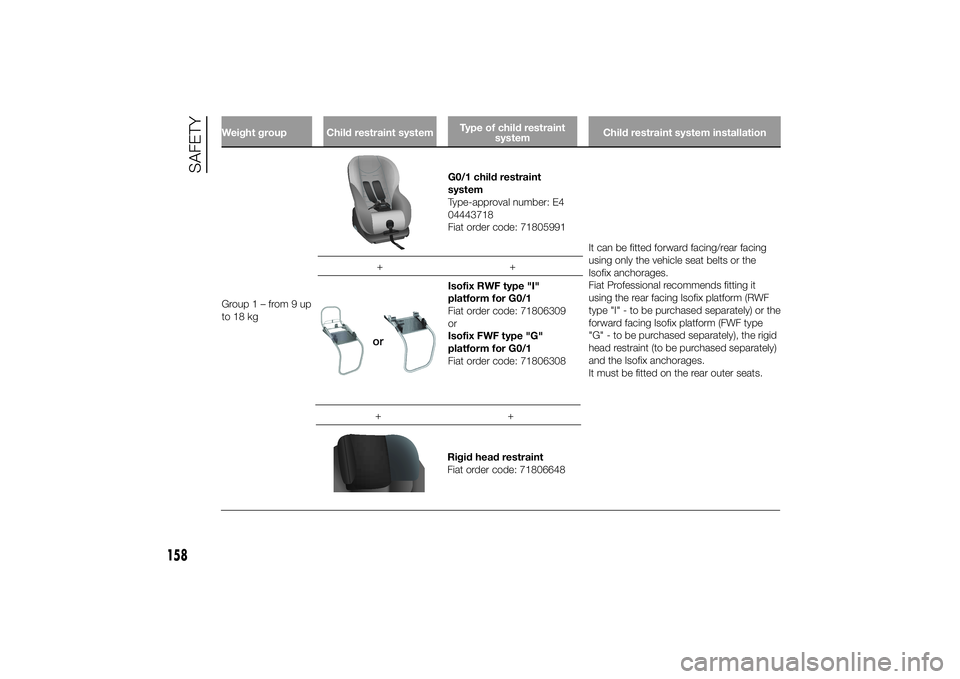
Weight group Child restraint systemType of child restraint
systemChild restraint system installationGroup1–from9up
to 18 kg
G0/1 child restraint
system
Type-approval number: E4
04443718
Fiat order code: 71805991
It can be fitted forward facing/rear facing
using only the vehicle seat belts or the
Isofix anchorages.
Fiat Professional recommends fitting it
using the rear facing Isofix platform (RWF
type "I" - to be purchased separately) or the
forward facing Isofix platform (FWF type
"G" - to be purchased separately), the rigid
head restraint (to be purchased separately)
and the Isofix anchorages.
It must be fitted on the rear outer seats. ++Isofix RWF type "I"
platform for G0/1
Fiat order code: 71806309
or
Isofix FWF type "G"
platform for G0/1
Fiat order code: 71806308
++Rigid head restraint
Fiat order code: 71806648
158
SAFETY
Page 163 of 367
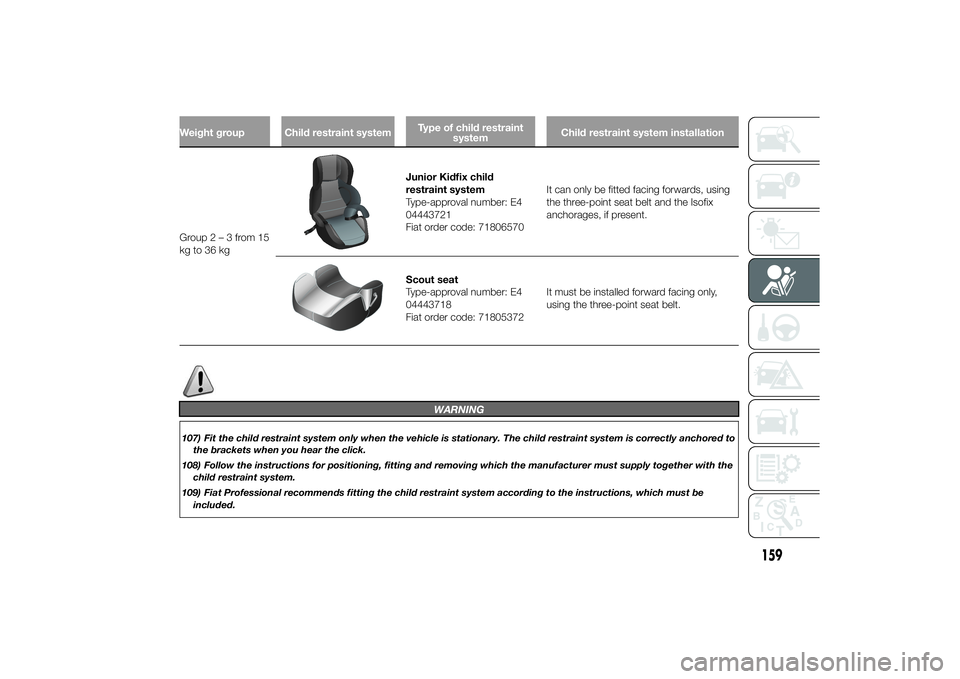
Weight group Child restraint systemType of child restraint
systemChild restraint system installationGroup2–3from15
kg to 36 kg
Junior Kidfix child
restraint system
Type-approval number: E4
04443721
Fiat order code: 71806570It can only be fitted facing forwards, using
the three-point seat belt and the Isofix
anchorages, if present.Scout seat
Type-approval number: E4
04443718
Fiat order code: 71805372It must be installed forward facing only,
using the three-point seat belt.
WARNING
107) Fit the child restraint system only when the vehicle is stationary. The child restraint system is correctly anchored to
the brackets when you hear the click.
108) Follow the instructions for positioning, fitting and removing which the manufacturer must supply together with the
child restraint system.
109) Fiat Professional recommends fitting the child restraint system according to the instructions, which must be
included.
159
Page 164 of 367
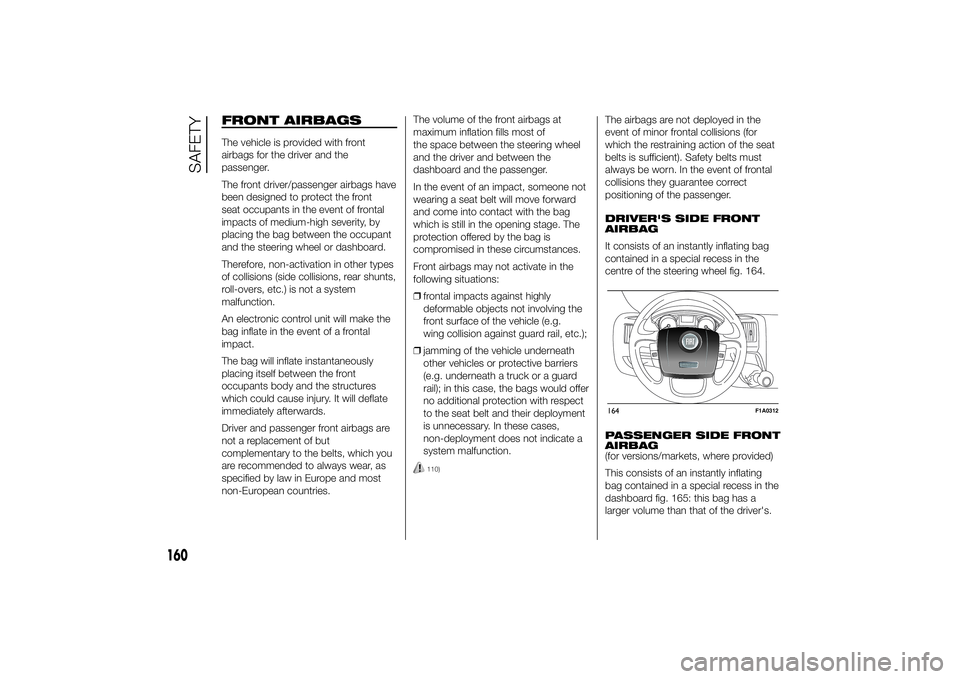
FRONT AIRBAGSThe vehicle is provided with front
airbags for the driver and the
passenger.
The front driver/passenger airbags have
been designed to protect the front
seat occupants in the event of frontal
impacts of medium-high severity, by
placing the bag between the occupant
and the steering wheel or dashboard.
Therefore, non-activation in other types
of collisions (side collisions, rear shunts,
roll-overs, etc.) is not a system
malfunction.
An electronic control unit will make the
bag inflate in the event of a frontal
impact.
The bag will inflate instantaneously
placing itself between the front
occupants body and the structures
which could cause injury. It will deflate
immediately afterwards.
Driver and passenger front airbags are
not a replacement of but
complementary to the belts, which you
are recommended to always wear, as
specified by law in Europe and most
non-European countries.The volume of the front airbags at
maximum inflation fills most of
the space between the steering wheel
and the driver and between the
dashboard and the passenger.
In the event of an impact, someone not
wearing a seat belt will move forward
and come into contact with the bag
which is still in the opening stage. The
protection offered by the bag is
compromised in these circumstances.
Front airbags may not activate in the
following situations:
❒frontal impacts against highly
deformable objects not involving the
front surface of the vehicle (e.g.
wing collision against guard rail, etc.);
❒jamming of the vehicle underneath
other vehicles or protective barriers
(e.g. underneath a truck or a guard
rail); in this case, the bags would offer
no additional protection with respect
to the seat belt and their deployment
is unnecessary. In these cases,
non-deployment does not indicate a
system malfunction.
110)
The airbags are not deployed in the
event of minor frontal collisions (for
which the restraining action of the seat
belts is sufficient). Safety belts must
always be worn. In the event of frontal
collisions they guarantee correct
positioning of the passenger.
DRIVER'S SIDE FRONT
AIRBAG
It consists of an instantly inflating bag
contained in a special recess in the
centre of the steering wheel fig. 164.
PASSENGER SIDE FRONT
AIRBAG
(for versions/markets, where provided)
This consists of an instantly inflating
bag contained in a special recess in the
dashboard fig. 165: this bag has a
larger volume than that of the driver's.164
F1A0312
160
SAFETY
Page 165 of 367
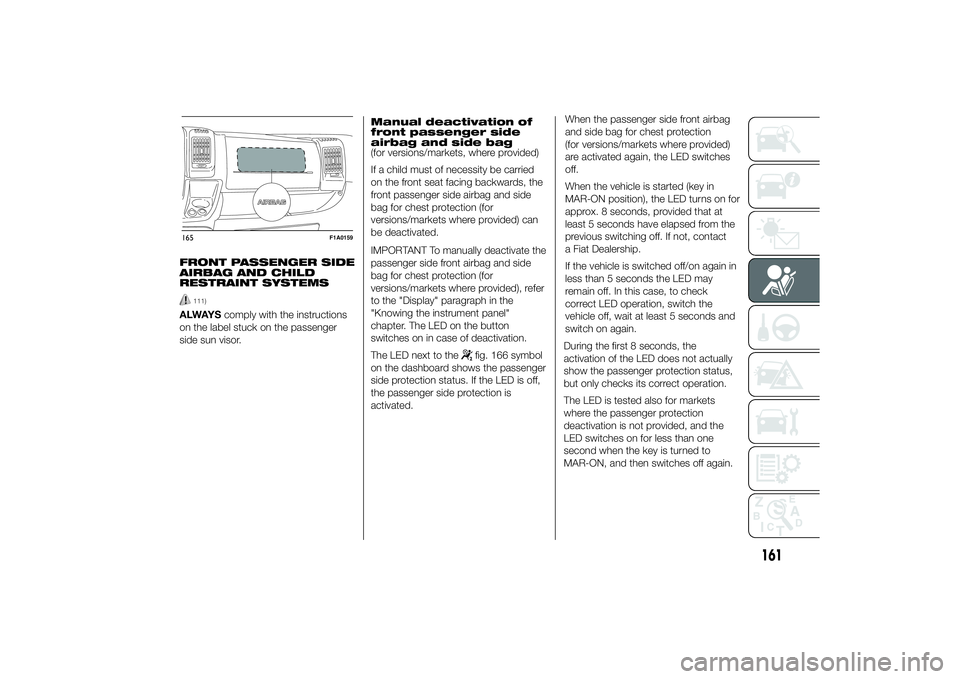
FRONT PASSENGER SIDE
AIRBAG AND CHILD
RESTRAINT SYSTEMS
111)
ALWAYScomply with the instructions
on the label stuck on the passenger
side sun visor.Manual deactivation of
front passenger side
airbag and side bag
(for versions/markets, where provided)
If a child must of necessity be carried
on the front seat facing backwards, the
front passenger side airbag and side
bag for chest protection (for
versions/markets where provided) can
be deactivated.
IMPORTANT To manually deactivate the
passenger side front airbag and side
bag for chest protection (for
versions/markets where provided), refer
to the "Display" paragraph in the
"Knowing the instrument panel"
chapter. The LED on the button
switches on in case of deactivation.
The LED next to the
fig. 166 symbol
on the dashboard shows the passenger
side protection status. If the LED is off,
the passenger side protection is
activated.When the passenger side front airbag
and side bag for chest protection
(for versions/markets where provided)
are activated again, the LED switches
off.
When the vehicle is started (key in
MAR-ON position), the LED turns on for
approx. 8 seconds, provided that at
least 5 seconds have elapsed from the
previous switching off. If not, contact
a Fiat Dealership.
If the vehicle is switched off/on again in
less than 5 seconds the LED may
remain off. In this case, to check
correct LED operation, switch the
vehicle off, wait at least 5 seconds and
switch on again.
During the first 8 seconds, the
activation of the LED does not actually
show the passenger protection status,
but only checks its correct operation.
The LED is tested also for markets
where the passenger protection
deactivation is not provided, and the
LED switches on for less than one
second when the key is turned to
MAR-ON, and then switches off again.
165
F1A0159
161
Page 166 of 367
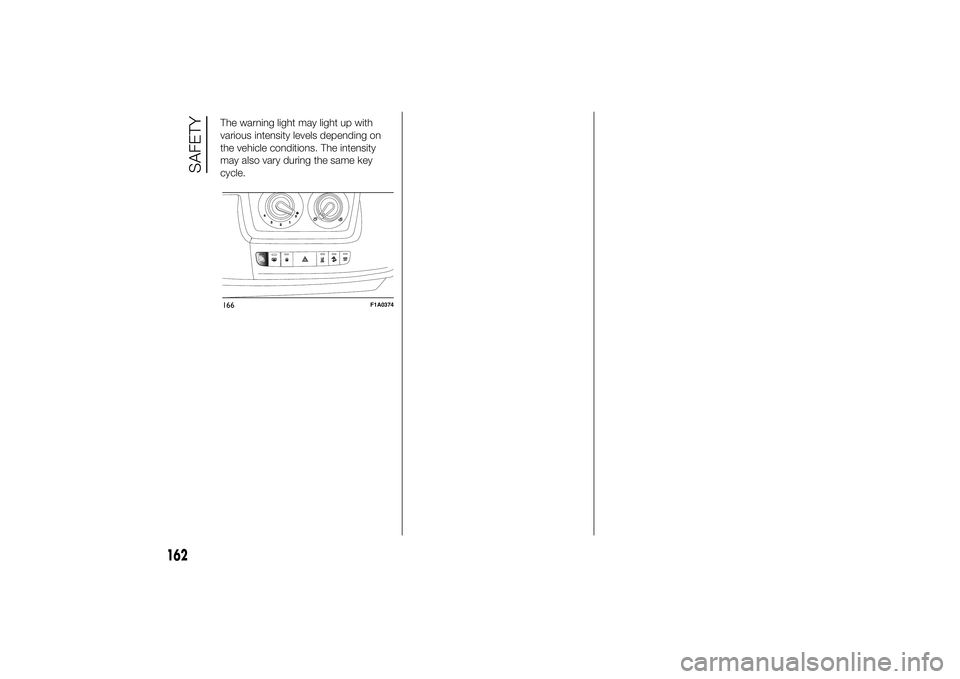
162
SAFETY
The warning light may light up with
various intensity levels depending on
the vehicle conditions. The intensity
may also vary during the same key
cycle.166
F1A0374
Page 167 of 367
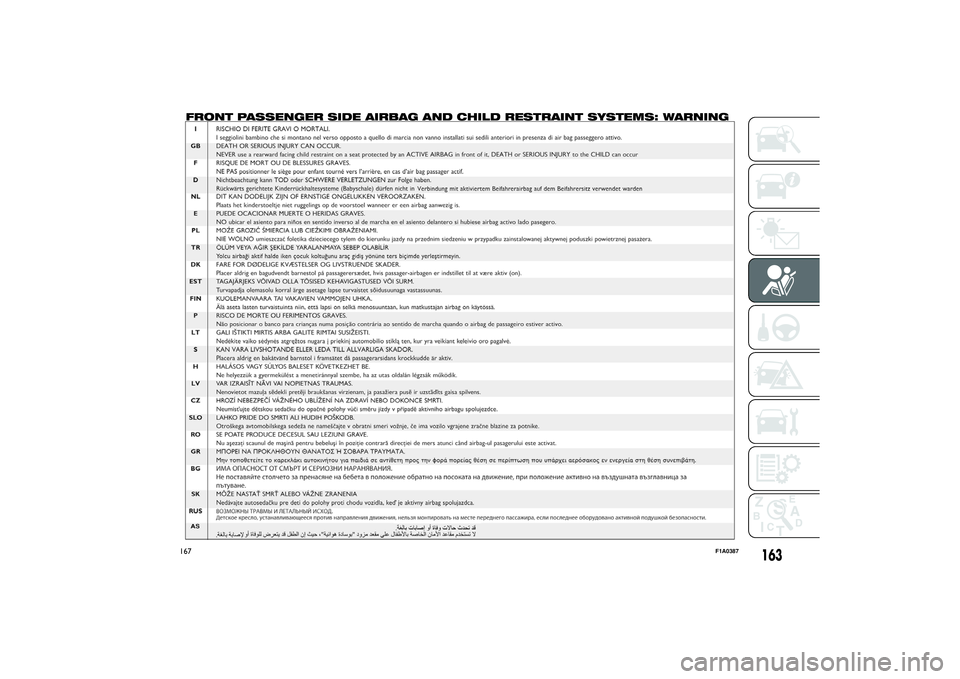
167
F1A0387
163
FRONT PASSENGER SIDE AIRBAG AND CHILD RESTRAINT SYSTEMS: WARNING
Page 168 of 367
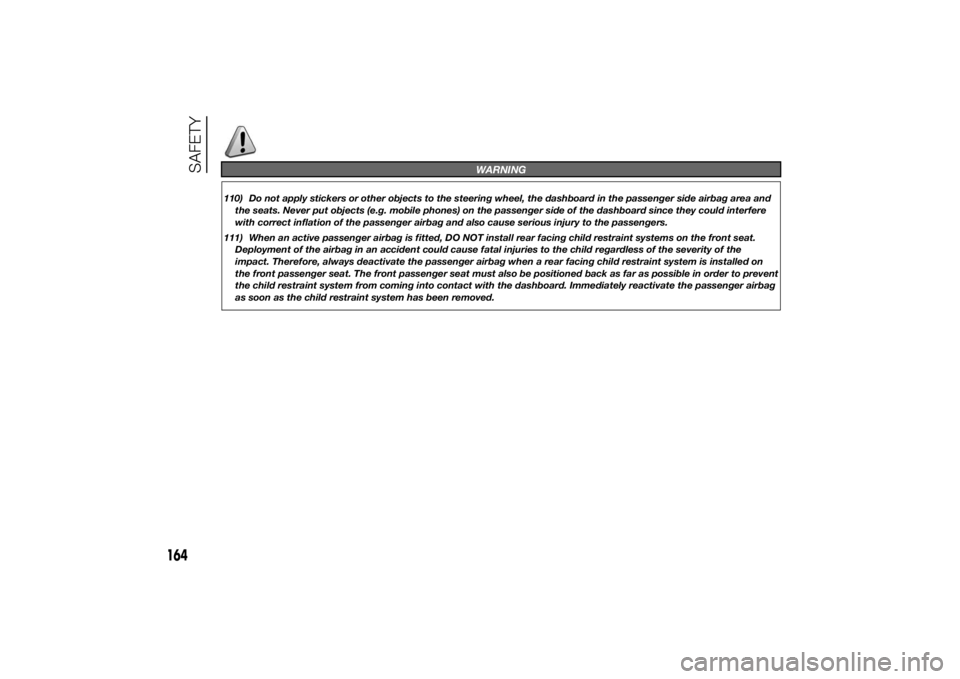
WARNING
110) Do not apply stickers or other objects to the steering wheel, the dashboard in the passenger side airbag area and
the seats. Never put objects (e.g. mobile phones) on the passenger side of the dashboard since they could interfere
with correct inflation of the passenger airbag and also cause serious injury to the passengers.
111) When an active passenger airbag is fitted, DO NOT install rear facing child restraint systems on the front seat.
Deployment of the airbag in an accident could cause fatal injuries to the child regardless of the severity of the
impact. Therefore, always deactivate the passenger airbag when a rear facing child restraint system is installed on
the front passenger seat. The front passenger seat must also be positioned back as far as possible in order to prevent
the child restraint system from coming into contact with the dashboard. Immediately reactivate the passenger airbag
as soon as the child restraint system has been removed.
164
SAFETY
Page 169 of 367
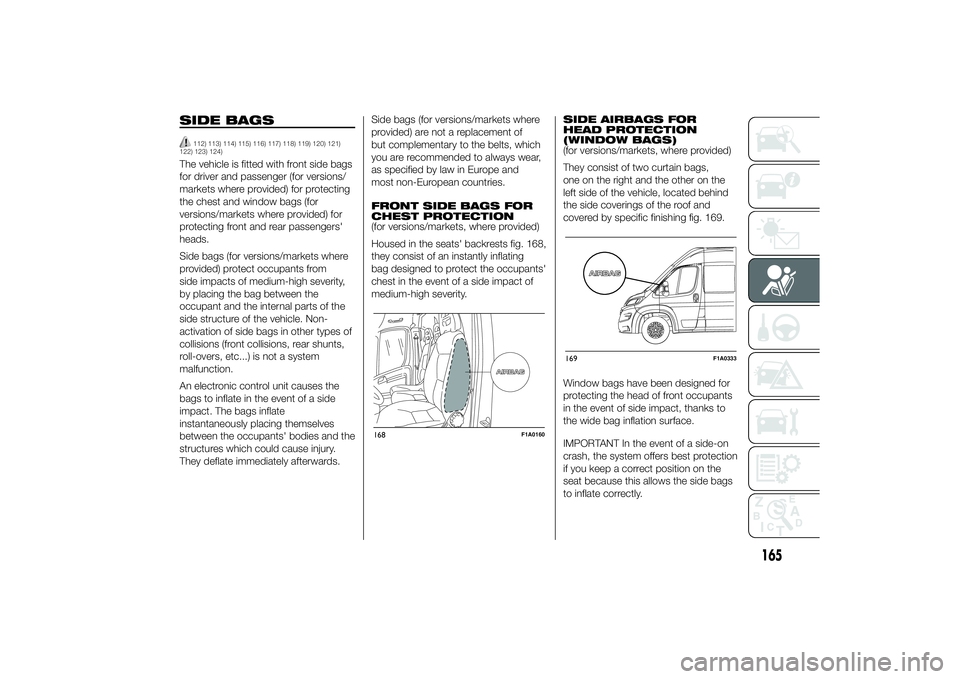
SIDE BAGS
112) 113) 114) 115) 116) 117) 118) 119) 120) 121)
122) 123) 124)
The vehicle is fitted with front side bags
for driver and passenger (for versions/
markets where provided) for protecting
the chest and window bags (for
versions/markets where provided) for
protecting front and rear passengers'
heads.
Side bags (for versions/markets where
provided) protect occupants from
side impacts of medium-high severity,
by placing the bag between the
occupant and the internal parts of the
side structure of the vehicle. Non-
activation of side bags in other types of
collisions (front collisions, rear shunts,
roll-overs, etc...) is not a system
malfunction.
An electronic control unit causes the
bags to inflate in the event of a side
impact. The bags inflate
instantaneously placing themselves
between the occupants' bodies and the
structures which could cause injury.
They deflate immediately afterwards.Side bags (for versions/markets where
provided) are not a replacement of
but complementary to the belts, which
you are recommended to always wear,
as specified by law in Europe and
most non-European countries.
FRONT SIDE BAGS FOR
CHEST PROTECTION
(for versions/markets, where provided)
Housed in the seats' backrests fig. 168,
they consist of an instantly inflating
bag designed to protect the occupants'
chest in the event of a side impact of
medium-high severity.SIDE AIRBAGS FOR
HEAD PROTECTION
(WINDOW BAGS)
(for versions/markets, where provided)
They consist of two curtain bags,
one on the right and the other on the
left side of the vehicle, located behind
the side coverings of the roof and
covered by specific finishing fig. 169.
Window bags have been designed for
protecting the head of front occupants
in the event of side impact, thanks to
the wide bag inflation surface.
IMPORTANT In the event of a side-on
crash, the system offers best protection
if you keep a correct position on the
seat because this allows the side bags
to inflate correctly.
168
F1A0160
169
F1A0333
165
Page 170 of 367
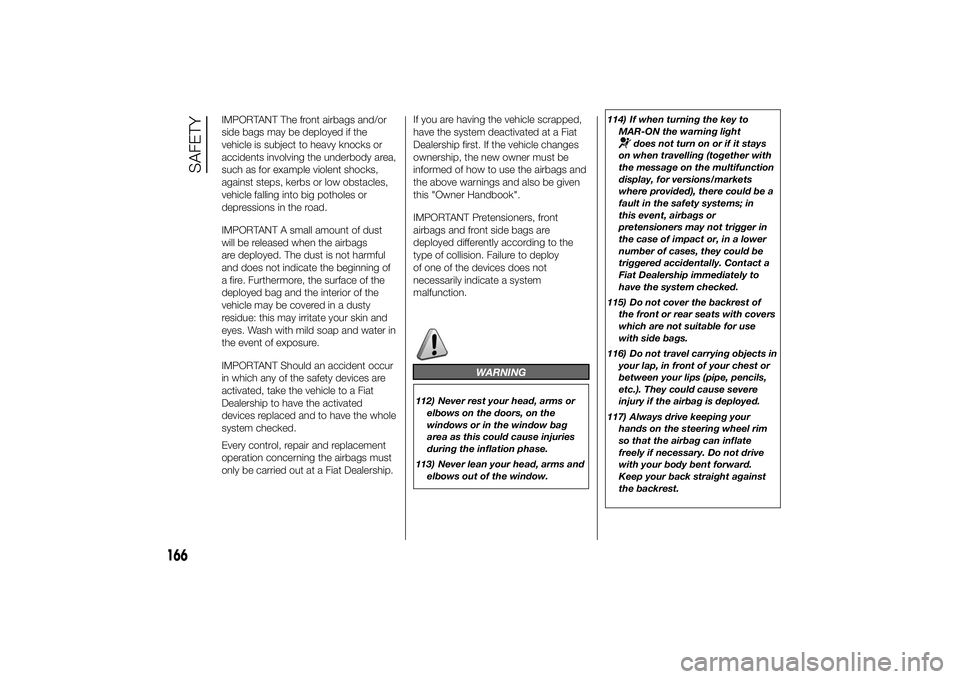
IMPORTANT The front airbags and/or
side bags may be deployed if the
vehicle is subject to heavy knocks or
accidents involving the underbody area,
such as for example violent shocks,
against steps, kerbs or low obstacles,
vehicle falling into big potholes or
depressions in the road.
IMPORTANT A small amount of dust
will be released when the airbags
are deployed. The dust is not harmful
and does not indicate the beginning of
a fire. Furthermore, the surface of the
deployed bag and the interior of the
vehicle may be covered in a dusty
residue: this may irritate your skin and
eyes. Wash with mild soap and water in
the event of exposure.
IMPORTANT Should an accident occur
in which any of the safety devices are
activated, take the vehicle to a Fiat
Dealership to have the activated
devices replaced and to have the whole
system checked.
Every control, repair and replacement
operation concerning the airbags must
only be carried out at a Fiat Dealership.If you are having the vehicle scrapped,
have the system deactivated at a Fiat
Dealership first. If the vehicle changes
ownership, the new owner must be
informed of how to use the airbags and
the above warnings and also be given
this "Owner Handbook".
IMPORTANT Pretensioners, front
airbags and front side bags are
deployed differently according to the
type of collision. Failure to deploy
of one of the devices does not
necessarily indicate a system
malfunction.
WARNING
112) Never rest your head, arms or
elbows on the doors, on the
windows or in the window bag
area as this could cause injuries
during the inflation phase.
113) Never lean your head, arms and
elbows out of the window.114) If when turning the key to
MAR-ON the warning light
does not turn on or if it stays
on when travelling (together with
the message on the multifunction
display, for versions/markets
where provided), there could be a
fault in the safety systems; in
this event, airbags or
pretensioners may not trigger in
the case of impact or, in a lower
number of cases, they could be
triggered accidentally. Contact a
Fiat Dealership immediately to
have the system checked.
115) Do not cover the backrest of
the front or rear seats with covers
which are not suitable for use
with side bags.
116) Do not travel carrying objects in
your lap, in front of your chest or
between your lips (pipe, pencils,
etc.). They could cause severe
injury if the airbag is deployed.
117) Always drive keeping your
hands on the steering wheel rim
so that the airbag can inflate
freely if necessary. Do not drive
with your body bent forward.
Keep your back straight against
the backrest.
166
SAFETY